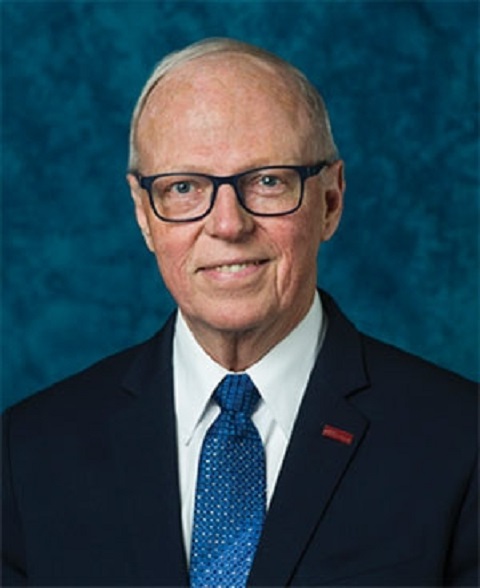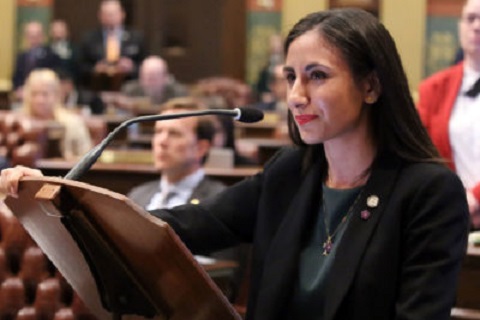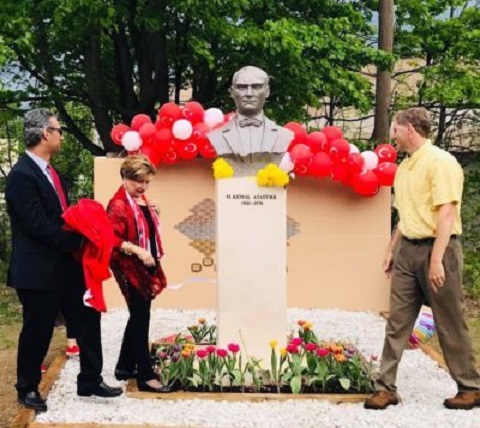As the local Armenian community attempted to regroup and respond to the situation, a proclamation from the governor of Michigan, Gretchen Whitmer, was also released to the same effect, with a change of verbiage to “Turkish Heritage and Children’s Day.”
The offensiveness of the proclamations is, of course, not due to their celebration of Turkish heritage, but to their timing to the day before Armenian Genocide Remembrance Day on April 24.
Read also
The proclamations also caused offense by, rather than discussing the heritage of the Turkish culture in a neutral way, instead actively promoting the supposed positive contributions of the Republic of Turkey in world affairs with the following statement: “The Republic of Turkey, a secular democratic state, has made significant contributions to United States foreign policy in the Balkans, the Middle East, Central Asia, and the Caucasus and has played a crucial role in international efforts for peace, prosperity, and stability.” (italics in the original)
Where It Happened
Southfield is home to St. John’s Armenian Church of Greater Detroit, one of the largest parishes of the Eastern Diocese of the Armenian Church of America, and the only Diocesan parish serving Michigan.
The only K-12 Armenian day school in the US outside of California is the AGBU Alex and Marie Manoogian School which along with the museum, library, radio studio, gym, Veterans’ Memorial Building and other community institutions are housed on the same grounds as St. John’s.
In addition, Southfield is home to the Armenian Congregational Church of Greater Detroit with its sanctuary and hall only a few miles away. Suffice it to say that Armenians have a presence in Southfield, even if demographically they have increasingly moved out of the city into other neighboring suburbs.
Not only do Armenians have a major presence, but they have a great relationship with the city of Southfield. Most Southfield mayors and other elected officials in recent history have visited St. John’s and the AGBU School and have even spoken on various occasions, strengthening the ties between the Armenian community and the municipality. Moreover, Nancy Malkasian Banks served for years as the Southfield City Clerk and currently serves as a member of the City Council. In fact, the City of Southfield also released a proclamation recognizing April 24 of this year as a day of remembrance of the Armenian Genocide.
The other two cities were Warren and Ann Arbor. Though Warren’s Armenian population is unknown and probably relatively small, Ann Arbor, the home of the University of Michigan has a small active Armenian community and boasts a very active Armenian Studies Department at the University with two endowed professorships in Armenian Studies, one for Armenian Language and Literature and one for Armenian History. Even some of the ethnic Turkish professors at the University are staunch Armenian allies. Ann Arbor is also known as one of the most liberal towns in the United States.
It was also notable that the three cities were spread across the Detroit Metro area: with Warren in Macomb County, Southfield in Oakland County, and Ann Arbor in Washtenaw County, all three of the suburban counties surrounding Detroit were covered.
It is not known at this time if any municipality in Wayne County, home of the City of Detroit, made a similar proclamation.
The strategic placement of the municipalities including Warren, the largest municipality in Macomb County; Southfield, the home of so many Armenian institutions; and Ann Arbor, the largest city in Washtenaw county and a seat of culture with the University of Michigan; seemed calculated, rather than, for example, representing cities with a large Turkish-American population.
Finally, the proclamation from the governor was also a major surprise. Armenians have always had an outsized presence in the State of Michigan as a whole, with the well-known Manoogian and Mardigian families championing the Detroit Institute of the Arts, one of the premier art museums in the country. But it is not the super wealthy but average donors who have invigorated the State of Michigan since the Armenian community, now numbering around 40,000, began to form in Detroit around 1909 and grew with the rise of the automobile industry.
Armenians started out as factory workers, cobblers, and fruit peddlers, and rose to success as small business owners. (A Detroit Armenian is credited with opening the first automatic car wash in the United States.) Later immigrant waves have had great success in the jewelry business. Today, the community boasts doctors, lawyers, engineers, and other professionals, in addition to musicians and artists. The Armenian community as a whole is well known in the state, with a stellar reputation and has consistently participated in inter-ethnic events, inter-faith dialogue (including a robust, close relationship with the Jewish community going back to the 1960s), the upbuilding of municipalities, universities, and other public institutions, and even getting the Michigan legislature to recognize Artsakh and mandate Armenian Genocide education in the schools.
In addition to all the above, the Armenian community’s own Rep. Mari Manoogian (no relationship to the late industrialist Alex Manoogian), a rising star in the Democratic party, is an active member of the Michigan state legislature in Lansing and has been in the past an advisor to Michigan governor Whitmer herself, in addition to spearheading some of the pro-Armenian actions of the state legislature. In fact, Manoogian was responsible for the municipality of Birmingham, MI, which she represents, issuing a proclamation commemorating the Armenian Genocide on April 24 this year, as well as the unanimous adoption of a statewide proclamation from the legislature in Lansing.
So, how could this all happen?
A Ripple Through the Community
Most community members found out about the proclamations through emails that were sent by various watchful eyes from the community itself. As the news of the mayoral proclamations spread, community activists sent emails in protest to the three mayors and spread the word about the concern. Of the more professionally worded missives was sent by Alice Nigoghosian. Nigoghosian, a book publishing consultant, member of the school board for AGBU Alex and Marie Manoogian, was evidently one of the first to find out about the proclamations, and sent an “open letter” email to the mayors of the three cities, on which she CC’ed a number of community activists. She politely but sternly criticized the mayors for their actions and attempted to explain why this was offensive for the Armenian community.
The response was underwhelming. The mayors did not seem to understand what was going on. Solidarity with the Armenian cause was expressed, but there was a palpable disconnect.
Then the governor issued her proclamation, which was widely shared on social media, and the local Armenian community was in an outrage. With controversy swirling, Rep. Mari Manoogian, went ahead as planned, introducing the annual resolution to commemorate the Armenian Genocide in the State of Michigan in a speech in the legislature on Friday, April 23, after which the resolution passed unanimously. Then she released a “proclamation” of her own in regard to the governor’s proclamation of “Turkish Heritage and Children’s Day”:
“The timing of this proclamation — which was issued on the eve of Armenian Genocide Remembrance Day — is unfortunate because it aids Turkey’s continued effort to deny the genocide of more than 1.5 million Armenians, Assyrians, Greeks and others, and diminishes the mourning of Armenian Americans on an incredibly solemn day. Let me be clear: Michigan not only recognizes the Armenian Genocide, but also mandates the teaching of the Armenian Genocide in our public schools. Our state reaffirmed our commitment to Armenian Genocide recognition yesterday in the Michigan House of Representatives through the passage of a resolution that I introduced, and we will continue to uplift the stories of Michigan’s Armenian American community.”
Digging Deeper
Although not all the mayors’ offices could be contacted in time for this article, Southfield City Council member Nancy Malkasian Banks elucidated what may be a common storyline to the situation in all three municipalities. Banks shared that the office of the mayor of Southfield is largely ceremonial. One of the duties which the mayor has is to issue rote proclamations upon the request of private individuals, organizations or communities. These proclamations could range from recognizing Earth Day to honoring a veteran, from a signed letter to a couple on their 50th anniversary to a proclamation honoring a great-grandmother upon turning 100. Anniversaries for churches and synagogues are common, and every year the Armenian community requests and receives a proclamation for April 24 — this year included. Importantly, these requests go directly to the mayor’s office, who generally signs all of them, and does not have to inform the city council. For that reason, Banks did not know of the proclamation until the emails started to be exchanged in the community and her phone began to ring.
A Turkish-American organization known as TACAM (Turkish American Cultural Association of Michigan) was responsible for requesting the proclamation, Banks revealed from public documents at her disposal. The documents also showed that TACAM sent a “model proclamation” to the city for them to edit at their discretion. Evidently, Whitmer’s office thought that recognizing “Turkish sovereignty” was too strong for an American state government, and they changed it to “Turkish heritage” but the “sovereignty” language was left in by the municipalities.
Southfield mayor Kenson Siver expressed to Banks that he felt he had been used and taken advantage of because this proclamation had been turned into something political, which he did not realize when he signed it. Like so many other proclamations that he signs, he thought it was a simple courtesy for recognizing the Turkish people’s contribution in the world. The fact that Siver is a longtime friend of the Armenians and ally of Armenian causes seemed irrelevant — a publicly elected official has to treat all people and groups equally, and to Siver’s eyes the proclamation didn’t raise any red flags. Above all, since the title describes it as a recognition of “children’s day,” and Siver has been a teacher and advocate for children his entire life, it would seem prejudiced not to sign such an “innocuous” proclamation.
It seems that “innocuous” is just what TACAM was going for. They didn’t send out “model proclamations” asking Michigan mayors to deny the Armenian Genocide, or even to accuse the Armenians of atrocities against the Turks in 1915 or against the Azeris at Khojaly. Those types of proclamations might have raised red flags which would cause Michigan mayors and the Michigan governor, in most cases Armenian allies, to consult their Armenian friends and colleagues on the matter. Recognizing “children’s day” did not seem to fit the bill. Yet, Armenians who deal with the politics of April 24 can read between the lines.
For one thing, it is apparently true that Mustafa Kemal Ataturk declared April 23 as National Sovereignty and Children’s Day in Turkey and that this was because the Grand National Assembly of Turkey was first convened on April 23, 1920. Why Kemal chose that date to convene the first assembly seems highly questionable, but leaving that aside, the April 23 date is not even the most important Turkish national holiday. For example, Turkish Independence Day, also known as Republic Day, is celebrated on October 29. Yet we did not hear of any municipalities issuing proclamations for that day.
Secondly, by perusing TACAM’s newsletters, many of which are accessible in PDF form online, it is clear that while much of their activity is heritage-based and involves cultural activities for Turkish-American children, they also have a political component which has consistently advocated against recognition of the Armenian Genocide. Moreover, their umbrella organization is ATAA (Assembly of Turkish American Associations) notorious for its denialist lobbying.
In addition, TACAM has purchased acreage of property in the municipality of Wixom, which in 2019 was dedicated as Ataturk Park. Some parts of Ataturk Park are, indeed, innocuous — like the children’s play structure and the forested path. But in the heart of the park stands a proud bust of Mustafa Kemal Ataturk — the nationalist strongman under whose administration the denial of the Armenian Genocide was initiated as one of the building blocks of modern Turkey, and whose agenda Turkish-Americans are still carrying out, possibly from the offices in the small building on the premises.
Aftermath
On Sunday, April 25, Siver, along with the Oakland County Executive David Coulter, Representative Mari Manoogian and Southfield City Council member Nancy Malkasian Banks, attended requiem service at St. John’s Armenian Church which was followed by a short service of intercessory prayer in honor of the martyred saints of the Armenian Genocide, outside the church in front of a khachkar memorial. Fr. Aren Jebejian invited the political figures to speak, and Siver read aloud a proclamation commemorating the Armenian Genocide on behalf of the City of Southfield, handing the document to Jebejian.
In a conversation Siver again expressed his frustration that he had been taken advantage of, noted that he originally signed the Turkish proclamation because the title and most of the language referred to “Children’s Day,” and staunchly stated that this “would not happen again.”
In their speeches, County Executive Coulter praised the Armenian community for their contribution to the region, while Representative Manoogian thanked the Armenian community for “having my back” so that she can continue to advocate for Armenian issues at the state level and so the community can work together to watch out for insidious lobbying like what took place in Michigan this year. Meanwhile, all present came together in a celebratory mood thanks to President Biden’s recognition of the Armenian Genocide the previous day.
Main Photo Caption: Southfield mayor Kenson Siver

























































